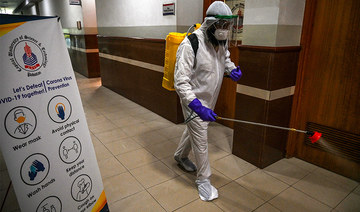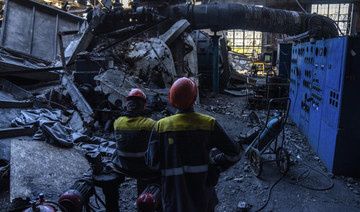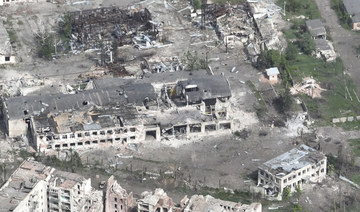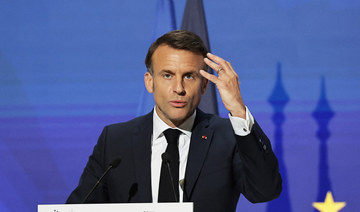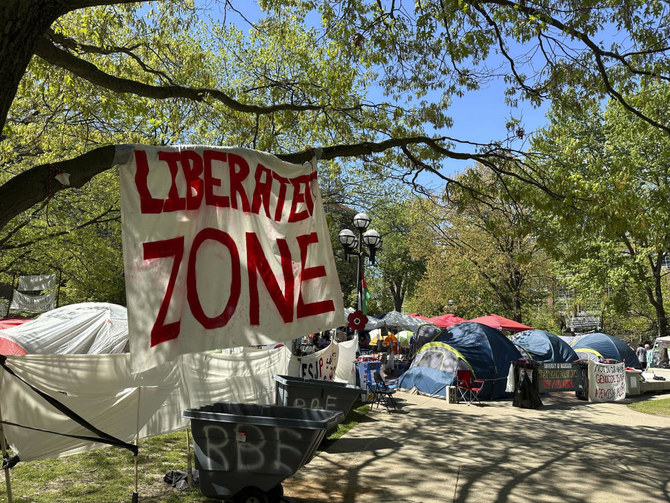PARIS: More than one million people have died from the coronavirus, according to an AFP toll, with no let-up in a pandemic that has ravaged the world economy, inflamed diplomatic tensions and upended lives from Indian slums and Brazilian jungles to America’s biggest city.
Sports, live entertainment and international travel ground to a halt as fans, audiences and tourists were forced to stay at home under strict measures imposed to curb the contagion.
Drastic controls that put half of humanity — more than four billion people — under some form of lockdown by April at first slowed the spread, but since restrictions were eased, infections have soared again.
By 0630 GMT Monday, the disease had claimed 1,001,093 victims from 33,112,474 recorded infections, according to an AFP tally collected from official sources by journalists stationed around the world, and compiled by a dedicated team of data specialists.
The United States has the highest death toll with more than 200,000 fatalities, followed by Brazil, India, Mexico and Britain.
For Italian truck driver Carlo Chiodi, those figures include both his parents, whom he lost within days of each other.
“What I have a hard time accepting is that I saw my father walking out of the house, getting into the ambulance, and all I could say to him was ‘goodbye’,” Chiodi, 50, told AFP.
“I regret not saying ‘I love you’ and I regret not hugging him. That still hurts me.
With scientists still racing to develop a vaccine, governments have again been forced into an uneasy balancing act: Virus controls slow the spread of the disease, but they hurt already reeling economies and businesses.
The IMF earlier this year warned that the economic upheaval could cause a “crisis like no other” as the world’s GDP collapsed, though the Fund’s outlook appears brighter now than it did in June.
Europe, hit hard by the first wave, is now facing another surge in cases, with Paris, London and Madrid all forced to introduce controls to slow infections threatening to overload hospitals.
Masks and social distancing in shops, cafes and public transport are now part of everyday life in many cities around the world.
Mid-September saw a record rise in cases in most regions and the World Health Organization has warned virus deaths could even double to two million without more global collective action.
Infections in India, home to 1.3 billion people, surged past six million on Monday, but authorities pressed ahead with a reopening of the battered South Asian economy.
Santosh, a creative writing student in India, said the virus was now “part of our lives.”
“You cannot shut down every business, because the economy cannot collapse... Covid-19 is not going to pay the rent.”
The SARS-CoV-2 virus that causes the illness known as Covid-19 made its first known appearance in the central Chinese city of Wuhan, ground zero of the outbreak.
How it got there is still unclear but scientists think it originated in bats and could have been transmitted to people via another mammal.
Wuhan was shut down in January as other countries looked on in disbelief at China’s draconian controls, even as they went about their business as usual.
By March 11, the virus had emerged in over 100 countries and the WHO declared a pandemic, expressing concern about the “alarming levels of inaction.”
Patrick Vogt, a family doctor in Mulhouse, a city that became the outbreak’s epicenter in France in March, said he realized coronavirus was everywhere when doctors started falling ill, some dying.
“We saw people in our surgery who had really big breathing problems, young and not-so-young who were exhausted,” he said. “We didn’t have any therapeutic solutions.”
Currently, nine vaccine candidates are in last-stage clinical trials, with hopes some will be rolled out next year.
The least privileged around the globe have been the hardest hit by the breakneck spread of the virus, which has also infected some among the powerful, rich and famous.
British Prime Minister Boris Johnson spent a week in hospital. Madonna and Tom Hanks also tested positive.
The Tokyo Olympics, Rio’s Carnival and the Muslim pilgrimage to Makkah are among the major events postponed or disrupted by the pandemic.
Some major sports tournaments have resumed but with empty stadiums — such as Premier League football in England — or highly restricted spectator counts. The French Open is limiting access to 1,000 tennis fans a day.
As the restrictions tighten, protests and anger are rising as businesses worry about their survival and individuals grow frustrated about their jobs and families in the face of another round of lockdown measures.
Authorities have clashed with anti-lockdown protesters around the world. While many are reacting to economic pain, supporters of widely debunked conspiracy theories about the pandemic have also come out in the thousands from Melbourne to London.
Along with the turmoil, though, lies some hope, with Wuhan now appearing to have controlled the disease.
“Life has returned to the kind of flavour we had before,” resident An An said. “Everyone living in Wuhan feels at ease.”




